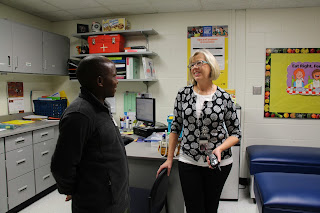Day Six: Schools
Today we visited an elementary school and a college. Here we are in the nurse's office at Rosemount Elementary with Jeanne Fifield.
We spent an hour in Mrs. Kelly's kindergarten class, observing the student's morning routine. We got to talk with students as they worked on their writing projects. At story time, John was impressed with how the teacher would pause at key points in the story, asking children to predict what might happen next. He noted that Tanzanian education systems do not foster the critical thinking skills being developed even at this early age.
John found a special friend.
We spent the second hour in a second grade classroom equipped with a Smart board. The teacher here is a member of Easter Lutheran in nearby Eagan, and had visited Iringa and Nyanzwa in 2006. She had shared some of her photos and experiences with the children, who prepared questions for John.
What are your homes like?
Do you live in a city, suburb or rural area?
Do you have water and electricity?
What kind of animals live there?
What do you eat?
What language do you speak?
The children were surprised to learn that in addition to English and Swahili, John had first learned his tribal language, Bena, and a neighboring tribal language, Hehe.
They shared many things, and particularly enjoyed the story of how the elephant walking through Mahove knocked over one of the water spigots. Another topic of interest was mosquitoes, malaria and mosquito nets. One of the students is a member of Shepherd of the Valley, and she told how she had been part of the effort to raise money for mosquito nets for the children of Tungamalenga. We were happy to share what Dr. Barnabas had told us -- that in the year following our first gift of mosquito nets, the number of children seen at the dispensary dropped from several hundred to less than 25. "Do the mosquito nets work?" the teacher asked, and the kids, shouted, "YES!"
A side note about how pervasive are the Bega Kwa Bega partnerships in this area -- in addition to the school nurse who knows our partnership at Shepherd of the Valley, and the second grade teacher who is involved in the partnership at Easter, even the principal introduced himself to John saying, I'm a member of Como Park Lutheran and we are partnered with a congregation in the Iringa Diocese.
As we left the school, John commented, "I wish my children could attend a school like this."
When I asked him what impressed him, he again came back to the development of critical thinking skills, the small class size, and the professionalism of the teachers. Having seen Tanzanian schools, I would have thought that his comments might have focused on the resources available in US schools -- the books, the bright colored posters, the technology, the kid sized tables and chairs, the playground equipment -- all a harsh contrast with the Tanzanian schoolrooms that have water damage, a few rough benches, and perhaps only one or two books for up to 80 children in a class.
John takes a moment to email Addy.
After lunch at home, Paula Swiggum picked up John for an afternoon at St Olaf College in nearby Northfield.
He met with Professor Joseph Mbele, a Tanzanian native on the St Olaf faculty. Prof. Mbele has been a helpful resource on cultural issues and wrote the book that we recommend every traveler read: Tanzanians and Americans, Cultural Differences.
John said it was very good to speak with another Tanzanian again, and received good advice about studying hard, pursuing advanced degrees, and about publishing journal articles and books rather than spending money on luxury cars or other things.
Hannah Hanssen met John in Iringa in 2010 and is now a St Olaf student. She joined John in the chapel where he was watching the choir Cantorei rehearse. "I felt so excited to see her since it was a long time since I've seen her." John met her parents at worship Sunday at Shepherd of the Valley.
John enjoyed the attractive campus.
We had great conversation tonight with our dinner guests -- church council president Steve Mueller and his wife Kari, Pastor Duane and Phyllis Paetznick, and Katie and Nate Strand.
Steve asked John about his thesis topic -- people's participation in development projects at the grassroots level. What are the factors that help or hinder participation? John said getting the community's buy in before the project is started is key -- communication and community ownership of the project will encourage participation. We talked about examples of projects in our own partnership that worked or didn't work and we could trace the success or failure to exactly those factors.
We started talking about what's up for John tomorrow -- Wednesday, the long day at church. The Schedule has us leaving the house at nine AM and not returning until 9 PM: a visit to Shannon Park Elementary, lunch with the pastors, a meeting with vision project manager Kari Slotten, and then confirmation classes. We'll end the day with a short time in senior choir.
We're going to bed soon so that we have energy for the long, full day tomorrow!













Comments
Post a Comment